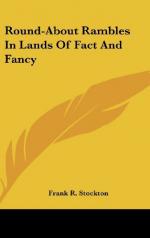Other plants take note of times and seasons. The sensitive plant obeys no regular rules of this kind, but acts according to circumstances.
When I was a boy, I often used to go to a green-house where there were a great many beautiful and rare plants; but I always thought that the sensitive plant was the most wonderful thing in the whole collection, and I did not know then how susceptible it was to the influence of light. I was interested in it simply because it seemed to have a sort of vegetable reason, and understood that it should shut up its leaves whenever I touched it.
[Illustration: The sensitive plant.]
But there were things around me in the vegetable kingdom which were still more wonderful than that, and I took no notice of them at all.
In the garden and around the house, growing everywhere, in the most common and ordinary places, were vines of various kinds—I think there were more morning-glories than anything else—and these exhibited a great deal more sense, and a much nearer approach to reasoning powers, than the sensitive plants, which were so carefully kept in the green-house.
When one of these vines came up out of the earth, fresh from its seed, the first thing it wanted, after its tendrils began to show themselves, was something to climb up upon. It would like a good high pole. Now, if there was such a pole within a few feet of the little vine it would grow straight towards it, and climb up it!
It would not grow first in one direction, and then in another and then in another, until it ran against something to climb on, but it would go right straight towards the pole, as if it saw it, and knew it was a good one for its purpose.
I think that there is not much in the vegetable kingdom more wonderful than that.
SIR MARMADUKE.
[Illustration]
Sir Marmaduke was a good old English gentleman, all of the olden time. There you see him, in his old-fashioned dining-room, with his old-fashioned wife holding her old-fashioned distaff, while he is surrounded by his old-fashioned arms, pets, and furniture.
On his hand he holds his hawk, and his dogs are enjoying the great wood fire. His saddle is thrown on the floor; his hat and his pipes lie near it; his sword and his cross-bows are stood up, or thrown down, anywhere at all, and standing by his great chair is something which looks like a coal-scuttle, but which is only a helmet.
Sir Marmaduke was certainly a fine old gentleman. In times of peace he lived happily with his family, and was kind and generous to the poor around him. In times of war he fought bravely for his country.
But what a different old gentleman would he have been had he lived in our day!
Then, instead of saying “Rebeck me!” and “Ods Boddikins!” when his hawk bit his finger or something else put him out of humor, he would have exclaimed, “Oh, pshaw!” or, “Botheration!” Instead of playing with a hawk, he would have had a black-and-tan terrier,—if he had any pet at all; and his wife would not have been bothering herself with a distaff, when linen, already spun and woven, could be bought for fifty cents a yard. Had she lived now, the good lady would have been mending stockings or crocheting a tidy.




